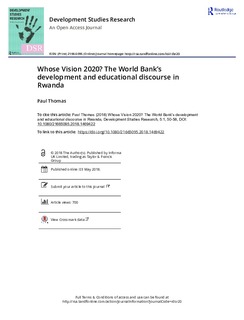| dc.contributor.author | Thomas, Paul | |
| dc.date.accessioned | 2018-11-13T08:25:16Z | |
| dc.date.available | 2018-11-13T08:25:16Z | |
| dc.date.created | 2018-05-17T14:29:28Z | |
| dc.date.issued | 2018 | |
| dc.identifier.citation | Development Studies Research. 2018, 5 (1), 50-58. | nb_NO |
| dc.identifier.issn | 2166-5095 | |
| dc.identifier.uri | http://hdl.handle.net/11250/2572088 | |
| dc.description | This is an Open Access article distributed under the terms of the Creative Commons Attribution License, which permits unrestricted use, distribution, and reproduction in any medium, provided the original work is properly cited. | nb_NO |
| dc.description.abstract | n this paper, I argue that the World Bank’s development strategy in Rwanda is unsuitable for long-term sustainability. By applying content analysis I consider the strategic goals as outlined in the World Bank’s Rwanda – Country partnership strategy for the period 2014–2018, and Learning for All: investing in people’s knowledge and skills to promote development, 2011; and Rwanda’s Vision 2020; to show how the Bank’s pursuit of narrow economic parameters is to the detriment of issues such as social inequality and the suppression of dissent. Given Rwanda’s traumatic recent history, I argue that the contours of Bank policy, which evolved from ‘rolling back the state’ to ‘good governance’ in recent years – understood as selective collaboration with bureaucratic elites in stable, but often authoritarian regimes must incorporate credible plans that address the current human rights abuses, shortcomings in the rule of law and democratic deficit in the country. Furthermore, I argue that Rwanda and the Bank's recent focus on ‘knowledge’ is in essence an educational discourse that is skewed in favor of neoliberal, economic activity – what has been called ‘knowledge capitalism’ (Wanner 2009). | nb_NO |
| dc.description.sponsorship | This work was supported by University of Southeast Norway. | nb_NO |
| dc.language.iso | eng | nb_NO |
| dc.publisher | Taylor and Francis | nb_NO |
| dc.rights | Navngivelse 4.0 Internasjonal | * |
| dc.rights.uri | http://creativecommons.org/licenses/by/4.0/deed.no | * |
| dc.title | Whose Vision 2020? The World Bank’s development and educational discourse in Rwanda | nb_NO |
| dc.title.alternative | Whose Vision 2020? The World Bank’s development and educational discourse in Rwanda | nb_NO |
| dc.type | Journal article | nb_NO |
| dc.type | Peer reviewed | nb_NO |
| dc.description.version | publishedVersion | nb_NO |
| dc.rights.holder | © 2018 The Author(s). | nb_NO |
| dc.source.pagenumber | 50-58 | nb_NO |
| dc.source.volume | 5 | nb_NO |
| dc.source.journal | Development Studies Research | nb_NO |
| dc.source.issue | 1 | nb_NO |
| dc.identifier.doi | 10.1080/21665095.2018.1469422 | |
| dc.identifier.cristin | 1585509 | |
| cristin.unitcode | 222,59,7,0 | |
| cristin.unitname | Institutt for pedagogikk | |
| cristin.ispublished | true | |
| cristin.fulltext | original | |
| cristin.qualitycode | 1 | |

